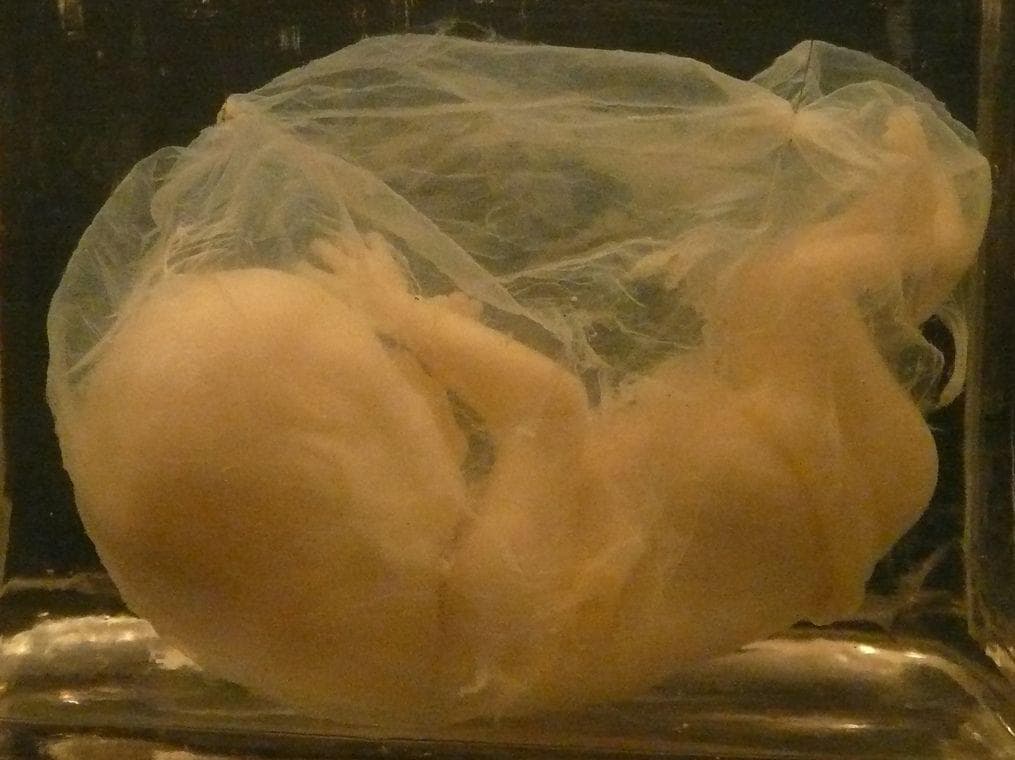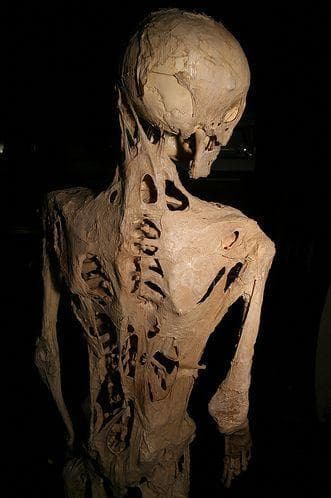-
(#1) Only Two Babies Are Born With Down Syndrome Each Year In Iceland
Down syndrome is disappearing in Iceland, but not because of a medical breakthrough or health trends for pregnant women. Only one or two babies are born each year with Down syndrome because the others are terminated.
In Iceland, about 85% of women choose to do prenatal testing, which can show Down syndrome and other genetic conditions in the first trimester. The same tests are available in the United States, but only about two thirds of women terminate the pregnancy, as opposed to nearly 100% in Iceland.
Pregnancy counselor Helga Sol Olafsdottir explained to CBS News why nearly all women in Iceland opt to terminate pregnancies that screened positive for genetic abnormalities: "We don't look at abortion as a murder. We look at it as a thing that we ended. We ended a possible life that may have had a huge complication... preventing suffering for the child and for the family. And I think that is more right than seeing it as a murder - that's so black and white. Life isn't black and white. Life is gray."
-
(#2) The Ethical Dilemma Behind Eliminating Down Syndrome
Geneticist Kari Stefansson, the founder of deCODE Genetics, studies the entire Icelandic population's genomes. Stefansson calls the near-elimination of Down syndrome in Iceland "heavy-handed genetic counseling," which he does not think is a good idea. When it comes to wanting a healthy child, when is the line crossed? Some argue that terminating a fetus with Down syndrome requires believing that Down syndrome should be completely removed from society.
It is no doubt a complicated question, as genetic testing becomes more widespread and other conditions - not just Down syndrome - are brought into the limelight.
-
(#3) What Is Down Syndrome?
A typical cell has 46 chromosomes - 23 from the mother, and 23 from the father. Down syndrome occurs when there is an extra 21st chromosome, hence the moniker Trisomy 21. People with Down syndrome have developmental delays, distinct facial characteristics, are often shorter, and can also have a higher risk of developing epilepsy and Alzheimer's, among other conditions.
-
(#4) Prenatal Testing Is Changing
New noninvasive tests are becoming more and more common, as well as more affordable, for pregnant women to learn more about their unborn child. These new tests are able to be performed at 10 weeks, as opposed to 16-18 weeks. As tests get more common, doctors expect more diagnoses of conditions like Down syndrome, and even more growth in the prenatal testing market.
No one is forced to get prenatal testing, but doctors often suggest it. Most of these initial tests are screening tests, which tell the possibility of a child having a condition. Traditionally, diagnostic tests give more definite results and are ordered if the screening tests indicates it may be necessary. Down syndrome is not the only test that's screened for; spina bifida, brain and spinal conditions, cystic fibrosis, and others are tested for as well.
Amniocentesis, one of the most well-known prenatal tests, involves drawing amniotic fluid via a needle through the belly. Amniocentesis is often cited as dangerous and having a risk of miscarriage; however, this risk is only about .6%.
-
(#5) Genetic Mutations: Turning Into A Thing Of The Past
In August 2017, a heart condition in a fetus was corrected while still in the womb. The heart condition, a hereditary one, was effectively removed - meaning that the child wouldn't pass it on to their future children. However, that's just one case. While researchers hope to be able to correct anomalies while a fetus is in the womb, that is not a widespread possibility.
Now, the best medical professionals can do is give a woman information about her unborn child's potential genetics. Some, however, argue that earlier testing makes it easier to terminate a pregnancy, and advocates for those with Down syndrome note that those with the condition can still live a full life. Even in the case of correcting conditions still in the womb, some still cite ethical concerns - what constitutes an anomaly or abnormality, and who decides?
-
(#6) People With Down Syndrome Are Fighting Stereotypes
All around the world, people with Down syndrome are breaking boundaries and proving that Down syndrome isn't a disability, but rather makes one differently abled. In a nurturing environment, people with Down syndrome are able to develop life skills necessary to living independently; in some cases, they even go to college.
Mikayla Holmgren, a 22-year-old woman with Down syndrome, competed in the Miss Minnesota USA pageant in December 2017, making her the first to do so. In December 2016, Jack Barlow, a young boy with Down syndrome in Cincinnati, earned a spot dancing with the Cincinnati Ballet's production of The Nutcracker.
A young woman from Australia, Madeline Stuart, signed a modeling contract, putting yet another person with Down syndrome into the national spotlight, showing that those with Downs syndrome can not only live a full life, but excel in it.
-
(#7) It's Getting Political
As news of countries like Iceland spreads, states in the US are going an entirely different direction. The state of Ohio overwhelmingly passed legislature in December 2017 outlawing abortion for a fetus that "has or may have Down syndrome." Governor John Kasich is expected to sign the bill, making it a law. In December 2016, Ohio passed a 20-week abortion ban.
Critics of the law say this isn't about the rights of people with Down syndrome, but rather about outlawing abortion altogether and using differently abled people to further the anti-abortion agenda.
-
(#8) There Are Health Complications Associated With Down Syndrome
While those with Down syndrome generally have lower risks of cancer, they have higher risks of conditions like Alzheimer's, leukemia, epilepsy, and others. Every case of Down syndrome is unique, and while some may only have mild forms of developmental and intellectual problems, they can be moderate to severe in some cases. About half of infants born with Down syndrome have a heart defect, but these defects can usually be corrected by surgery.
-
(#9) The Causes Of Down Syndrome
Researchers have not yet uncovered why some fetuses develop an extra 21 chromosome; however, we do know that the fetuses of older women have a higher chance of developing the condition. At age 35, the chances go from about 1 in 1,000 to 12 in 1,000.
An older woman's eggs are simply older, but no one knows why older eggs are sometimes of a lower quality. Some studies indicate that older fathers can increase a fetus's chance of developing Down syndrome, but not as severely as an older mother can.
-
(#10) There Are Three Types Of Down Syndrome
Though many think Down syndrome is an all-inclusive term, there are actually three types of Down syndrome. Trisomy 21 accounts for 95% of cases, whereas translocation Down syndrome accounts for 3 - 4%. Translocation can be inherited from the mother or father, and in this case, the extra chromosome is attached to another.
With Mosaic Down syndrome, the least common, only some cells have 47 chromosomes and others have the typical 46. Those with Mosaic Down syndrome tend to have higher IQs than those with other forms of Down syndrome.
-
(#11) One Professor Wrote About His Complicated Feelings On This Issue
An assistant professor of political science at Villanova University, Mike Lawrence Schrad, wrote about his specific experience dealing with the news he and his wife received about their unborn daughter. The doctors consulted with Schrad and his wife about all the complications their child would suffer, mentioning the social ostracism their daughter would likely experience due to her Down syndrome diagnosis.
Schrad and his wife decided it would be best to keep the child, and they were surprised by the amount of "pushback" they received, especially considering he described both himself and his wife as "a couple of pro-choice liberals."
-
(#12) The Debate Rages On In The United States
In the United States, whether or not it's moral to abort a child with Down syndrome is still hotly debated. Many believe women should have the right to choose whether or not they want to care for a child with the disorder, and possibly subject the child to a life of pain. Others say this movement is basically eliminating an entire sub-group of the population, and that terminating a child with Down syndrome is furthering the unfair bias.
New Random Displays Display All By Ranking
About This Tool
There is a class of people in the world with very special faces. Us ordinary people can also tell at a glance. Down syndrome is a chromosomal mutation disease. There are many pathogenic factors known to humans, including parental behavior, heredity, and environment. Fortunately, prenatal screening and prenatal diagnosis can reduce the birth rate of children with Down's syndrome. Almost 100% of Icelandic pregnant women choose to terminate their pregnancy after diagnosis, this is why Down syndrome is disappearing in Iceland.
This fact sparked a fierce ethical debate on the Internet. Although many people accuse these abortions as forced, everyone has a choice because the mother does get neutral counseling. The random tool shares 12 facts about why Down syndrome is nearly eliminated in Iceland.
Our data comes from Ranker, If you want to participate in the ranking of items displayed on this page, please click here.






















